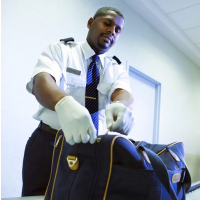Computers Auditioning to Replace Humans as Airport Carry-On Luggage Examiners
 (photo: Thinkstock/Comstock/Getty Images)
(photo: Thinkstock/Comstock/Getty Images)
By Associated Press
Federal officials said Tuesday that they are expanding tests to speed up airport lines and improve security.
In a first in the U.S., the Transportation Security Administration said Tuesday that it plans to begin using computed-tomography or CT scanners to inspect carry-on bags at one checkpoint in the Phoenix airport by the end of the year.
CT scanners are already used to screen checked baggage. The process is mostly automated — the scanners generate 3-D images that are analyzed by computers. Security workers only check a bag if something is suspicious.
The use of CT technology at airport checkpoints would eliminate the need for screeners to examine X-ray images of every bag. It could also let travelers leave liquids and laptops in their carry-on bags.
TSA said it will work with American Airlines to make other changes to increase automation and speed up screening this fall in Chicago, Dallas, Los Angeles and Miami.
American will spend $5 million on the changes, said the airline's chief operating officer, Robert Isom, in a letter to employees. He said neither the increased automation nor CT scanners will solve TSA's problems, "but they are both huge steps in the right direction."
The changes at Chicago's O'Hare Airport, Dallas-Fort Worth International Airport, Los Angeles International and Miami mirror a pilot program that TSA is running with Delta Air Lines in two lanes at the Atlanta airport. There, suspicious bags can be sent to a separate area for more screening while other bags on the conveyer belt keep moving. Bins are automatically sent back to the head of the line, and they are given radio-frequency-identification tags for better tracking.
The agency said the scanners and other steps will cut the time travelers spend in line by about 30 percent. Long checkpoint lines have become a nuisance for travelers. Security experts warn that the long lines create targets for terrorists that are outside security checkpoints.
Congress approved the hiring of nearly 800 new screeners and overtime pay for current ones, and TSA has reassigned some officers to the busiest airlines.
Homeland Security Secretary Jeh Johnson said TSA screened 10.7 million travelers over six days culminating with the July 4 holiday, and Thursday and Friday were the TSA's busiest days since 2007. Average wait time was less than 10 minutes and expedited PreCheck lines were under five minutes, he said.
To Learn More:
TSA Screeners Fail to Notice Mock Explosives and Banned Weapons in 67 of 70 Tests (by Noel Brinkerhoff, AllGov)
Former TSA Scanners Still Used in Government Buildings Easily Tricked by University Researchers (by Noel Brinkerhoff, AllGov)
TSA Confiscates an Average of more than 3 Loaded Guns a Day at Airports (by Matt Bewig, AllGov)
$1 Billion TSA Behavioral Screening Program Slammed as Ineffective “Junk Science” (by Noel Brinkerhoff, AllGov)
TSA’s Guide to Spotting Potential Terrorists at Airports (by Steve Straehley, AllGov)
- Top Stories
- Unusual News
- Where is the Money Going?
- Controversies
- U.S. and the World
- Appointments and Resignations
- Latest News
- Musk and Trump Fire Members of Congress
- Trump Calls for Violent Street Demonstrations Against Himself
- Trump Changes Name of Republican Party
- The 2024 Election By the Numbers
- Bashar al-Assad—The Fall of a Rabid AntiSemite






Comments